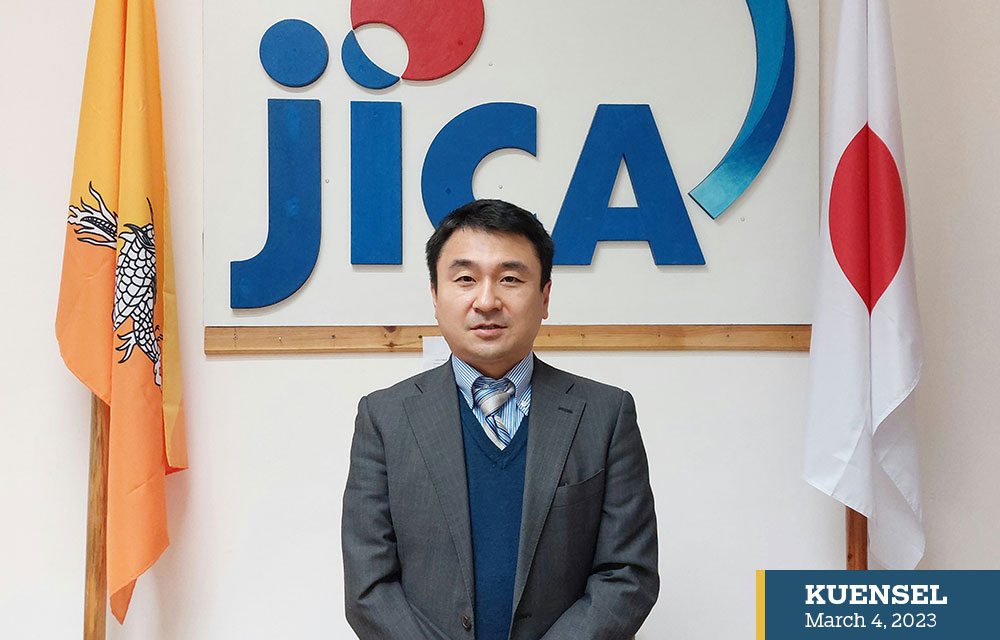Tomoyuki Yamada joined as the chief representative of the Japan International Cooperation Agency (JICA) Bhutan office on August 2022. He has more than two decades’ experience in planning and development and is an expert in private sector development, economic infrastructure, public-private partnerships, and education and training.
He talks with Kuensel’s Choki Wangmo about his plans and aspirations during his tenure.
How was your stay in Bhutan in the past six months?
Bhutan-Japan cooperation is founded on mutual attachment. Bhutan is popular in her branding across the world due to the development philosophy of Gross National Happiness. Japanese people got hope and special attachment from The King’s solidarity and kindness shown to the Japanese during the Fukushima nuclear disaster in 2011. I feel lucky to be posted in Bhutan and look forward to expanding this relationship between the two countries. The two countries have similar cultural, social, and environmental values. In the last few months, I realised that I am working with many sectors, most of which I had prior experience with.
What are some of the major cooperation plans during your tenure?
Japan and Bhutan face similar development issues and to address some of these challenges, we need a mutual approach. For example, Bhutan can learn from Japan’s experience in natural disasters like earthquakes and the increasing ageing population. Japan developed from a very poor country and has learnt lessons in development. Some of the development ideas can be replicated in Bhutan. After the Covid-19 pandemic, our priority is on sustainable economic growth and strengthening resilience. This means enhancing interactions in infrastructure, health, agriculture, and digital technology. Digital technology is a cross-cutting theme in all these sectors.
Can you elaborate more about these projects?
In the health sector, we are looking into preventive measures, such as Wearable Fetal Monitors “iCTG” for expecting mothers and assistive devices for people suffering from non-communicable diseases (NCDs). iCTG is a small and smart, wireless fetal monitoring device system that would ease the process of fetal monitoring for expecting mothers. NCDs are also a major health concern in the country. Assistive technology helps people with disabilities and elderly people to carry out their daily activities without difficulties. Such projects help meet the social needs of people across the country.
Rather than increasing production in the agriculture sector, Bhutan needs support in improving the supply chain. JICA’s market survey in January revealed that Bhutan’s agri-products have a potential market in Singapore. By providing soft loans and promoting market-oriented agriculture and horticultural products, JICA would be able to help small-scale farmers earn through increased export. The SHEP (Smallholder Horticulture Empowerment Promotion) concept, where farmers are market-conscious is successful in African countries.
Once Bhutan graduates from the Least Developed Countries (LDC) category, the conditions of foreign aid would change. To skill Bhutanese people in design and infrastructure, JICA will be cooperating in transferring Japan’s capacity to the Bhutanese workforce to build resilient structures using technology.
JICA is already in talks to enhance drone technology (if approved by the Japanese government) in Bhutan. One such initiative is the establishment of the global standard FabLab to enable a digital fabrication technology based in the College of Science and Technology. Digital technology application is the key theme we are seeking in the coming years.
Do you see any possible cooperation in the private sector? How can Bhutan revive its private sector?
There is no particular focus in the sector as of now. Generally, for the private sector to develop, a country should have open market access, predictable, consistent, attractive, transparent, clear and fair rules, a stable market, and a good business environment to attract investors. These are some of the basic requirements. Duplication of laws will hamper profitability.
How can Japan and Bhutan cooperate even if Bhutan graduates from the LDC?
The two countries can cooperate in many ways. Japan can support Bhutan start projects with soft loan projects—concessional Yen loans and grants—which might pump foreign reserves into the country’s depleting reserve. There is possible cooperation in technology and investments in the economic infrastructure like micro and mini-size hydropower projects. JICA will continue to bring Japanese volunteers to Bhutan. Currently, there are 27 active volunteers and the number is expected to increase soon.


